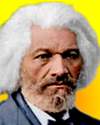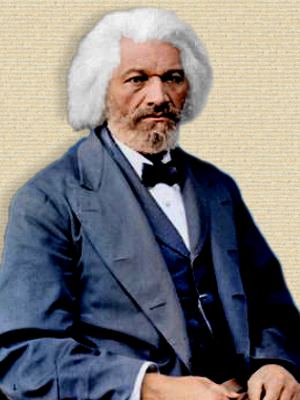 (source)
(source)
|
Frederick Douglass
(1818 - 20 Feb 1895)
American social reformer, orator and writer who was an African American that escaped from slavery, changed his name to Douglass, attended abolitionist meetings and spoke on his experience of as a slave. He became an orator on speaking tours, and wrote books. In 1872, he moved to Washington D.C. and held some prestigious offices in the community.
|
Science Quotes by Frederick Douglass (13 quotes)
“Does one error disappear only to make room for another?” … [L]et us look at the science of astronomy. How grand and magnificent have been the discoveries in that field of knowledge. What victories over error have been achieved by the telescope. That instrument did … bring down and dispel vast clouds of error, both in respect of the sky and of our planet. It must be confessed, too, that it took something from the importance of our planet. The idea that all the hosts of heaven are mere appendages to this earth is no longer entertained by average men, and … [almost no men] now stand by the old theory for which the church proposed to murder Galileo. Men are compelled to admit that the Genesis by Moses is less trustworthy as to the time of creating the heavens and the earth than are the rocks and the stars.
— Frederick Douglass
From speech (20 Nov 1883) delivered to the Bethel Literary and Historical Association, Washington D.C.,'It Moves, or Philosophy of Reform', collected in The Essential Douglass: Selected Writings and Speeches (2016), 290.
Art, science, discovery and invention, startle and bewilder us at every turn, by their rapid, vast and wonderful achievements. These forces have made men lords where they were vassals, masters where they were slaves, and kings where they were subjects. They have abolished the limitations of time and space and have brought the ends of the earth together.
— Frederick Douglass
From speech (20 Nov 1883) delivered to the Bethel Literary and Historical Association, Washington D.C.,'It Moves, or Philosophy of Reform' , collected in The Speeches of Frederick Douglass (2018), 387.
Franklin brought down the lightning, Morse made it a bearer of dispatches, and in answer to the increasing human demands of progressive human nature, Daguerre has taught the god of day to deck the world with pictures far beyond the art of ancient masters.
— Frederick Douglass
In Henry Louis Gates, Jr. (ed.), The Portable Frederick Douglass (2016), 350.
Hugh Miller, whose lamented death mantled the mountains and valleys of his native land with a broad shadow of sorrow, scarcely yet lifted, was a grand example of the success of persistent devotion, under great difficulties, to work and to the acquisition of knowledge. In a country justly distinguished for its schools and colleges, he, like Robert Burns, Scotia’s matchless son of song, was the true child of science, as Burns was of song. He was his own college. The earth was his school and the rocks were his school master. Outside of all the learned institutions of his country, and while employed with his chisel and hammer, as a stone mason, this man literally killed two birds with one stone; for he earned his daily bread and at the same time made himself an eminent geologist, and gave to the world books which are found in all public libraries and which are full of inspiration to the truth seeker.
— Frederick Douglass
From speech, 'Self-Made Men' (1872). [Scotia means Scotland.]
I do not know that I am an evolutionist, but to this extent I am one. I certainly have more patience with those who trace mankind upward from a low condition, even from the lower animals, than with those that start him at a high point of perfection and conduct him to a level with the brutes. I have no
sympathy with a theory that starts man in heaven and stops him in hell. … mankind as a whole must ever move onward, and increase in the perfection of character and in the grandeur of achievement.
— Frederick Douglass
From speech (20 Nov 1883) delivered to the Bethel Literary and Historical Association, Washington D.C.,'It Moves, or Philosophy of Reform' , collected in The Essential Douglass: Selected Writings and Speeches (2016), 289.
It is somewhat remarkable, that, at a time when knowledge is so generally diffused, when the geography of the world is so well understood—when time and space, in the intercourse of nations, are almost annihilated—when oceans have become bridges—the earth a magnificent hall—the hollow sky a dome—under which a common humanity can meet in friendly conclave—when nationalities are being swallowed up and the ends of the earth brought together—I say it is remarkable—nay, it is strange that there should arise a phalanx of learned men—speaking in the name of science—to forbid the magnificent reunion of mankind in one brotherhood. A mortifying proof is here given, that the moral growth of a nation, or an age, does not always keep pace with the increase of knowledge, and suggests the necessity of means to increase human love with human learning.
— Frederick Douglass
From Speech (12 Jul 1854), delivered At Western Reserve College, 'The Claims Of The Negro Ethnologically Considered', collected in Philip S. Foner, Yuval Taylor (eds.), Frederick Douglass: Selected Speeches and Writings (2000), 285.
It is the province of prejudice to blind; and scientific writers, not less than others, write to please, as well as to instruct, and even unconsciously to themselves, (sometimes), sacrifice what is true to what is popular.
— Frederick Douglass
In address, delivered at Commencement (12 Jul 1854), Western Reserve College, Hudson, Ohio, 'The Negro Ethnologically Considered', collected in The Speeches of Frederick Douglass (2018), 133. In his speech, Douglass challenged racially biased premises of ethnology, and Southern pretenders to science.
Mr. Auld … forbade Mrs. Auld to instruct me further, telling her … “A [slave] should know nothing but to obey his master… If you teach that [slave] (speaking of myself) how to read, there would be no keeping him. It would forever unfit him to be a slave.”
— Frederick Douglass
In autobiography, Narrative Of The Life Of Frederick Douglass (1851), 35. Often seen restated as “Knowledge makes a man unfit to be a slave.” [Webmaster has substituted “[slave]” in the subject quotation above, where the original text had a word much spoken in that period, but is now regarded too offensive to use.]
One cause of the error may be for want of a proper knowledge of the remote past. Here, as elsewhere, ’tis distance lends enchantment to the view. We fail to make due allowance for the refractive nature of the medium through which we are compelled to view the past. We naturally magnify the greatness of that which is remote. By this the imagination is addressed rather than the understanding. The dim and shadowing figures of the past are clothed in glorious light, and pigmies appear as giants.
— Frederick Douglass
From speech (20 Nov 1883) delivered to the Bethel Literary and Historical Association, Washington D.C.,'It Moves, or Philosophy of Reform' , collected in The Essential Douglass: Selected Writings and Speeches (2016), 288.
Science tells us what storms are in the sky and when and where they will descend upon our continent, and nobody now thinks of praying for rain or fair weather.
— Frederick Douglass
From speech (20 Nov 1883) delivered to the Bethel Literary and Historical Association, Washington D.C.,'It Moves, or Philosophy of Reform', collected in The Essential Douglass: Selected Writings and Speeches (2016), 291.
The highest services to man and the richest rewards to the worker at not conditioned entirely upon physical power. … The order of progress, is, first, barbarism; afterward, civilization. Barbarism
represents physical force. Civilization represents spiritual power. … [T]he waves of science and civilization rolling out over the Western prairies, soon leave him no room for his barbarous accomplishment.
— Frederick Douglass
From speech, 'Self-Made Men' (1872).
To deny education to any people is one of the greatest crimes against human nature. It is to deny them the means of freedom and the rightful pursuit of happiness, and to defeat the very end of their being.
— Frederick Douglass
From speech (3 Sep 1894), at Manassas Industrial School, Manassas, Virginia, 'Blessings of Liberty and Education', Frederick Douglass Papers, Library of Congress. [The date, he said, was the 56th anniversary of his “escape from bondage.”]
Vaccination was discovered, and, like all new discoveries, had at the first to maintain a vigorous battle for existence. It was condemned by the church as a cunning device of the devil to defeat the judgments of God. Nevertheless, it has triumphed, and is now adopted by the best instructed of all nations.
— Frederick Douglass
From speech (20 Nov 1883) delivered to the Bethel Literary and Historical Association, Washington D.C.,'It Moves, or Philosophy of Reform', collected in The Essential Douglass: Selected Writings and Speeches (2016), 290.
Quotes by others about Frederick Douglass (1)
Perseverance is my motto. It laid the Atlantic cable; it gave us the telegraph, telephone, and wireless. It gave to the world an Abraham Lincoln, and to a race freedom. It gave to the negro Booker T. Washington and Tuskegee Institute. It made Frederick Douglass the great orator that he was, and it gave to the race Paul Laurence Dunbar, and to poetry a new song.
In 'Wealthiest Negro Woman's Suburban Mansion: Estate at Irvington, Overlooking Hudson and Containing All the Attractions That A Big Fortune Commands', New York Times Sunday Magazine (4 Nov 1917), 4.







 In science it often happens that scientists say, 'You know that's a really good argument; my position is mistaken,' and then they would actually change their minds and you never hear that old view from them again. They really do it. It doesn't happen as often as it should, because scientists are human and change is sometimes painful. But it happens every day. I cannot recall the last time something like that happened in politics or religion.
(1987) --
In science it often happens that scientists say, 'You know that's a really good argument; my position is mistaken,' and then they would actually change their minds and you never hear that old view from them again. They really do it. It doesn't happen as often as it should, because scientists are human and change is sometimes painful. But it happens every day. I cannot recall the last time something like that happened in politics or religion.
(1987) -- 


